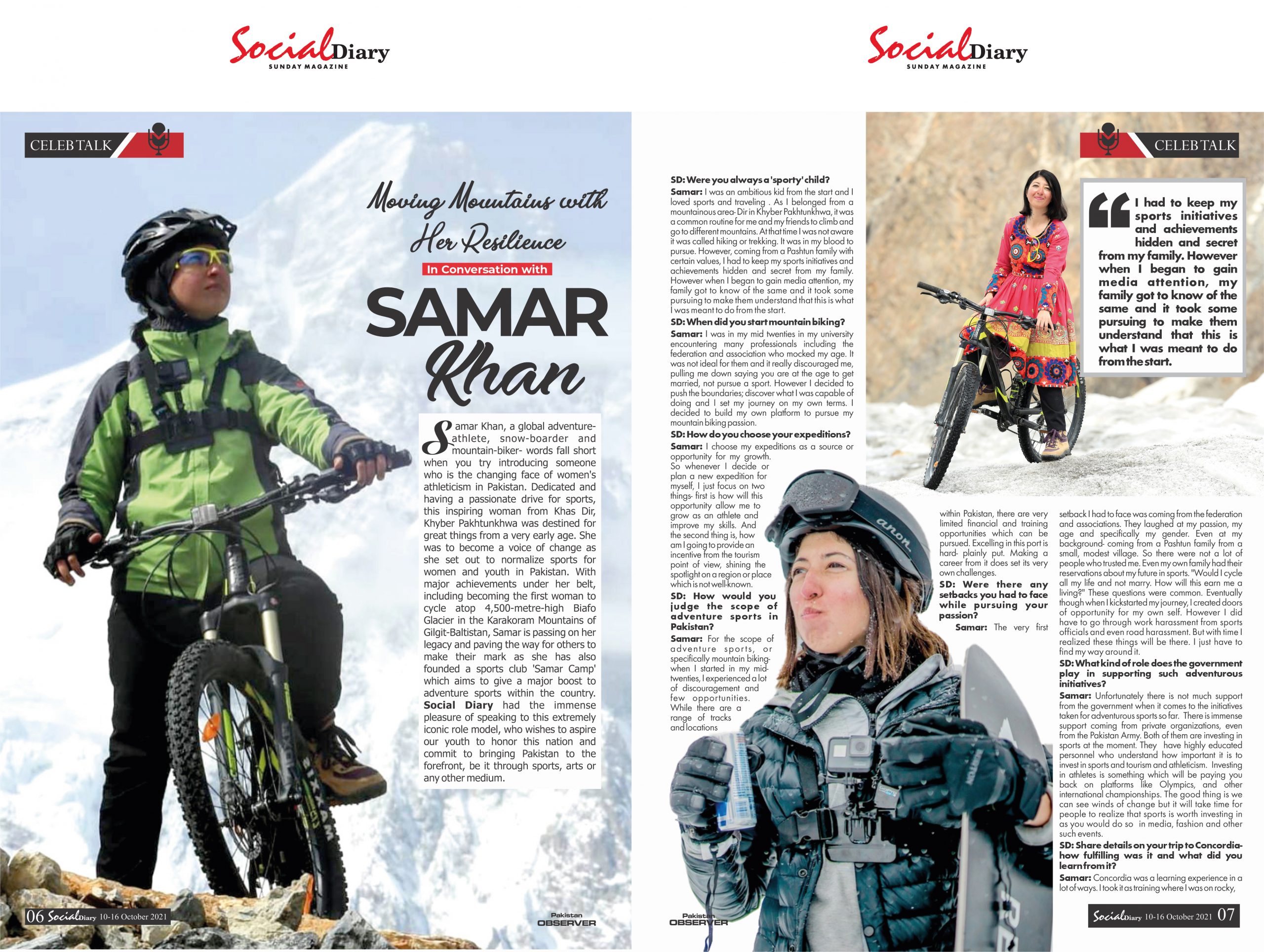Samar Khan, a global adventure-athlete, snow-boarder and mountain-biker- words fall short when you try introducing someone who is the changing face of women’s athleticism in Pakistan. Dedicated and having a passionate drive for sports, this inspiring woman from Khas Dir, Khyber Pakhtunkhwa was destined for great things from a very early age. She was to become a voice of change as she set out to normalize sports for women and youth in Pakistan. With major achievements under her belt, including becoming the first woman to cycle atop 4,500-metre-high Biafo Glacier in the Karakoram Mountains of Gilgit-Baltistan, Samar is passing on her legacy and paving the way for others to make their mark as she has also founded a sports club ‘Samar Camp’ which aims to give a major boost to adventure sports within the country. Social Diary had the immense pleasure of speaking to this extremely iconic role model, who wishes to aspire our youth to honor this nation and commit to bringing Pakistan to the forefront, be it through sports, arts or any other medium.
SD: Were you always a ‘sporty’ child?
Samar: I was an ambitious kid from the start and I loved sports and traveling . As I belonged from a mountainous area- Dir in Khyber Pakhtunkhwa, it was a common routine for me and my friends to climb and go to different mountains. At that time I was not aware it was called hiking or trekking. It was in my blood to pursue. However, coming from a Pashtun family with certain values, I had to keep my sports initiatives and achievements hidden and secret from my family. However when I began to gain media attention, my family got to know of the same and it took some pursuing to make them understand that this is what I was meant to do from the start.
SD: When did you start mountain biking?
Samar: I was in my mid twenties in my university encountering many professionals including the federation and association who mocked my age. It was not ideal for them and it really discouraged me, pulling me down saying you are at the age to get married, not pursue a sport. However I decided to push the boundaries; discover what I was capable of doing and I set my journey on my own terms. I decided to build my own platform to pursue my mountain biking passion.
SD: How do you choose your expeditions?
Samar: I choose my expeditions as a source or opportunity for my growth. So whenever I decide or plan a new expedition for myself, I just focus on two things- first is how will this opportunity allow me to grow as an athlete and improve my skills. And the second thing is, how am I going to provide an incentive from the tourism point of view, shining the spotlight on a region or place which is not well-known.
SD: How would you judge the scope of adventure sports in Pakistan?
Samar: For the scope of adventure sports, or specifically mountain biking- when I started in my mid-twenties, I experienced a lot of discouragement and few opportunities. While there are a range of tracks and locations within Pakistan, there are very limited financial and training opportunities which can be pursued. Excelling in this port is hard- plainly put. Making a career from it does set its very own challenges.

SD: Were there any setbacks you had to face while pursuing your passion?
Samar: The very first setback I had to face was coming from the federation and associations. They laughed at my passion, my age and specifically my gender. Even at my background- coming from a Pashtun family from a small, modest village. So there were not a lot of people who trusted me. Even my own family had their reservations about my future in sports. “Would I cycle all my life and not marry. How will this earn me a living?” These questions were common. Eventually though when I kickstarted my journey, I created doors of opportunity for my own self. However I did have to go through work harassment from sports officials and even road harassment. But with time I realized these things will be there. I just have to find my way around it.
SD: What kind of role does the government play in supporting such adventurous initiatives?
Samar: Unfortunately there is not much support from the government when it comes to the initiatives taken for adventurous sports so far. There is immense support coming from private organizations, even from the Pakistan Army. Both of them are investing in sports at the moment. They have highly educated personnel who understand how important it is to invest in sports and tourism and athleticism. Investing in athletes is something which will be paying you back on platforms like Olympics, and other international championships. The good thing is we can see winds of change but it will take time for people to realize that sports is worth investing in as you would do so in media, fashion and other such events.
SD: Share details on your trip to Concordia- how fulfilling was it and what did you learn from it?
Samar: Concordia was a learning experience in a lot of ways. I took it as training where I was on rocky, steep and thrilling paths for 7-8 hours , crossing the chilly cold streams coming from the glaciers. The harsh and unpredictable weather with narrow pathways. It all seemed like a scene from a Hollywood movie. It was a very overwhelming and fascinating trip. This definitely elevated my confidence and made me a much stronger person.

SD: As a woman and that too in Pakistan, do you face any hurdles and limitations due to your gender?
Samar: Not only in Pakistan, I have seen female athletes internationally and specially in Asia facing more struggles and challenges as compared to men. Catcalling, harassments- these are unfortunately a daily concern we must endure. I had to even fight two men physically in my sports journey; I had one arrested and one ran away. I had made a video on the incident which went viral. The issue is when a woman steps out of her comfort zone to showcase her confidence and strong personality, it threatens men and their fragile egos I believe. And I am not talking about the common people here; this is from the high-profile people including journalists and even sports officials who can easily body shame and do name-calling.
SD: How do you avoid the negativity that comes with being a public figure?
Samar: When I started my journey, 4-5 years back, I would find it traumatizing. I would cry and get depressed. But I would say it has made me a resilient person. I just now thank Allah for making me such an important person in a troller’s life for them to be talking and discussing me. I know my reality and my struggles and if anyone is not on board with that, then that is completely okay. I take it as a blessing in disguise.

SD: So what’s next?
Samar: Next includes both training and expeditions from international coaches to improve my skills further. I also want people to understand that when an individual pursues a certain sport, don’t expect them to become a champion within a year. To become one, it takes decades of hard work and encouragement to make a mark. It includes the support of people in the form of sponsorships as well. In this country we need to create a platform for our own selves including coaching, nutritional plans and even getting our own sponsors- the least we can get in return is respect and appreciation.
SD: What do you wish for youngsters and adventure seekers to learn from what you have been through?
Samar: Mentally prepare yourselves for the hardships. You will have to fight mindsets and various challenges. You have to be resilient when facing cultural norms, to grow and become an exemplary athlete. I am a fatherless child who is the only breadwinner of the family without any assistance. I had to do everything myself and it has taken me 6 years to come here- I am still learning and growing. So remain determined and don’t give up so easily. Discover your talent and even pave the way for untapped sports in the nation.

























